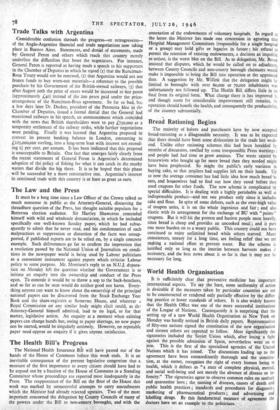The Health Bill's Progress
The National Health Insurance Bill will have passed out of the hands of the House of Commons before this week ends. It is an inevitable consequence of the present legislative congestion that a measure of the first importance to every citizen should have had to be argued out by a fraction of the House of Commons in a Standing Committee whose proceedings are reported most inadequately in the Press. The reappearance of the Bill on the floor of the House this week was marked by unsuccessful attempts to carry amendments which the Minister had already rejected upstairs. Two of the most important concerned the delegation by County Councils of many of the powers under the Bill to non-county boroughs, and with the
annexation of the endowments of voluntary hospitals. In regard tc the latter the Minister has made one concession in agreeing that Hospital Management Committees (responsible for a single hospital or a group) may hold gifts or legacies in future ; his refusal to permit the retention of existing endowments, a decision as impolitic as unjust, is the worst blot on the Bill. As to delegation, Mr. Bevan insisted that disputes, which he would be called on to adjudicate, between County Councils and non-county borough claimants would make it impossible to bring the Bill into operation at the appointed date. A suggestion by Mr. Willink that the delegation might be limited to boroughs with over 6o,000 or 70,000 inhabitants was unfortunately not followed up. The Health Bill differs little in its final from its original form. What change there is has improved :t. and though room for considerable improvement still remains, its operation should benefit the health, and consequently the productivity, of the country substantially.






























 Previous page
Previous page